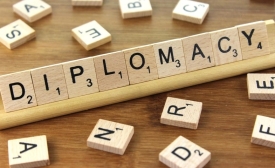science diplomacy

Katharina Höne challenges Shaun Riordan's recent blog about the threat of "new diplomacies".
As part of the International Peace Foundation's mission to build cultural bridges, Aaron Ciechanover, Finn E. Kyland, and Sir Richard Roberts held seminars at three North Korean universities.
What is science diplomacy? It is a growing political concept of using science as a means of foreign policy. Foreign policy is no longer exclusively hard diplomacy, but can include the exchange of knowledge, the exchange of scientists, and cooperation between states regarding prevalent science issues. [...] For example, in the Arctic it strengthens cooperation as a whole and serves as a means of deepening cooperation in other fields—what we call a spillover effect.

Shaun Riordan on how creating more subsets of diplomacy can lead to confusion about what diplomacy actually is.
The Sesame synchrotron opened its doors in Jordan this week, allowing scientists who would normally find it difficult to meet because of the troubled relations between their countries, to carry out collaborative research at a local facility.The Synchrotron-light for Experimental Science and Applications in the Middle East, situated 35 kilometres north of the Jordanian capital Amman, unites Cyprus, Iran, Israel, the Palestinian Authority and Turkey – countries usually hostile to each other. The other founding members include Bahrain, Egypt and Jordan.
The successful launch of the South Asian Satellite from Sriharikota onboard the Geosynchronous Satellite Launch Vehicle (GSLV) on Friday not only reiterated the technological prowess of India’s space agency, but was also a landmark in science diplomacy in the region. This is the first time a communication satellite built and launched by India will be put to the common use of South Asian countries.
This Saturday, in over 500 cities worldwide, thousands of people will take to the streets for an unprecedented show of support for all things evidence-based. The range of different groups joining the March for Science — from librarians to artists to teachers to oncologists — highlight the truth behind a phrase that is often dismissed as a cliché: Science really is a universal language. And it is that universality that makes science the ideal conduit for diplomacy in this moment in history.
In addition to the various groups of indigenous people who reside in the Arctic, eight countries Russia, Finland, Sweden, Norway, Iceland, Denmark, Canada, and the United States have claimed interest in the Arctic. Diplomacy between the different groups is required for cooperation and organization in the complicated region. Due to its importance in environmental security, sizable natural resource reserves, and remote location, the Arctic incentivizes cooperation through science diplomacy.







